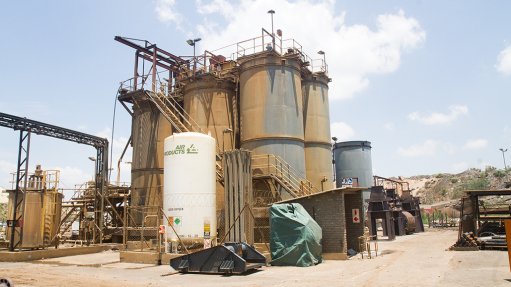BHP has a week to convince Anglo its South African plan can work
BHP Group just won an extra week to convince Anglo American on its $49-billion takeover plan. But the world’s biggest miner still must resolve the deal’s most intractable obstacle: What to do about South Africa?
After a month of rising tensions, the companies are holding discussions after BHP raised the value of its proposal for a third time on Monday. Anglo has rejected the latest bid, but agreed to extend a deadline for BHP to commit to a binding offer so that talks can continue.
The two sides are now closer to each other in their views on valuation for a deal, according to people familiar with the matter. However, the main sticking point for Anglo is BHP’s continued insistence that the London-based company must spin off its majority stakes in two South African miners to its own shareholders before the takeover can proceed.
Anglo still views the structure as too complicated, and is particularly concerned about who will cover the cost of any conditions imposed by South Africa’s government to approve the multi-step transaction, said the people, who asked not to be identified discussing private information.
A successful takeover would represent one of the biggest-ever mining deals and a defining moment for BHP CEO Mike Henry, who has spent years positioning the commodities giant for a return to large-scale M&A. The combined company would be the biggest copper producer — with about 10% of global mine supply — just as renewable energy demand is projected to surge in the coming years.
But while the agreement to extend the deadline and continue talks suggests progress, people with knowledge of BHP’s position were noticeably more optimistic that a deal is possible than those with insight into Anglo’s current views.
Anglo is concerned BHP’s demand that it first exit Anglo American Platinum and Kumba Iron Ore could leave the newly independent Johannesburg-listed companies to carry the cost of any concessions imposed by South Africa, reducing their value and ultimately penalising the current Anglo investors who would receive the shares in the spin offs. Anglo itself may also face conditions to complete the deal as proposed by BHP.
Anglo wants BHP to cover any such costs — either up front or in the future — and those discussions are likely to be a key focus of negotiations over the coming week, the people said.
Spokespeople for BHP and Anglo declined to comment.
From the moment BHP’s takeover approach first became public, South Africa has loomed front and center of a potential deal. It is home to some of Anglo’s biggest operations, employing tens of thousands of employees, and the company has deep political and social ties to the country with a history dating back to its founding in more than a century ago.
BHP by contrast does not have any operations in South Africa, and has at times appeared wrongfooted in its approach, with Henry and other senior officials scrambling to meet shareholders and officials in South Africa days after the news broke. The company also published a belated statement emphasising that its proposal that Anglo exit the Amplats and Kumba stakes wasn’t a reflection on its views about the country as an investment destination.
And the deal comes at a particularly awkward time, as South Africa heads toward what is expected to be the tightest election in the country’s democratic era — in fact, the new deadline for BHP to commit to a firm offer has been set for May 29, the same day as the national vote.
The approvals required for any deal would likely include South Africa’s competition authorities, as well as the central bank and finance ministry. Anglo is concerned that authorities could impose conditions that range from job guarantees to social and investment commitments, which could affect the value of the two South African units, and therefore the value of the shares to be received by Anglo’s investors in the spinoff.
Governments have a long history of using corporate deals to extract more favorable terms, and South Africa is grappling with widening inequality and one of the world’s worst unemployment rate, adding to the pressure to extract concessions.
Anglo’s second-biggest shareholder is the South African state-controlled pension fund, which on Wednesday issued a statement raising concerns about the previous BHP offer, just hours before the latest announcements.
“This would require a meaningful revision of the current BHP proposal that should take into consideration the material risks that current shareholders of both Anglo and its subsidiaries would have to assume over an extended time frame,” the Public Investment Corp. said at the time.
While one senior ruling party politician – Mines Minister Gwede Mantashe – has expressed personal opposition to BHP taking over Anglo, the government has refrained from commenting publicly on the proposed deal, let alone suggesting a preferred outcome.
DEALMAKERS CONFIDENT
But if South Africa’s Competition Tribunal does come to scrutinise the spinoff of Amplats and Kumba, the body will evaluate antitrust impacts but also “public interest” factors, including how a proposed change of ownership will affect employment levels and historically disadvantaged people.
BHP’s dealmakers are confident these obstacles can be addressed, according to the people. The company also sees the issue of price for a takeover as largely settled and does not intend to increase its offer, the people said.
Still, people close to Anglo still see significant gaps in how the scale of the South Africa problem is being perceived by the two sides.
Anglo shares swung after Wednesday’s announcements before closing 0.4% higher in London, still trading well below the value of BHP’s latest offer.
In conversations with five of Anglo’s top-20 shareholders on Wednesday, most said the latest news suggested the companies are getting closer to an acceptable price for Anglo and an agreement could be in reach. They said, however, that the major stumbling block remains BHP’s refusal so far to budge on the deal’s structure.
By undertaking to acquire Kumba – Anglo itself plans to spin off Amplats under its alternative plan – BHP could go a significant way to overcoming resistance to its existing proposal, some of the shareholders said.
“The companies believe that they’re getting closer,” said James Whiteside, metals and mining corporate research director at Wood Mackenzie, a consultancy. “Anglo has probably signposted what needs to happen to get it over the line.”
Article Enquiry
Email Article
Save Article
Feedback
To advertise email advertising@creamermedia.co.za or click here
Announcements
What's On
Subscribe to improve your user experience...
Option 1 (equivalent of R125 a month):
Receive a weekly copy of Creamer Media's Engineering News & Mining Weekly magazine
(print copy for those in South Africa and e-magazine for those outside of South Africa)
Receive daily email newsletters
Access to full search results
Access archive of magazine back copies
Access to Projects in Progress
Access to ONE Research Report of your choice in PDF format
Option 2 (equivalent of R375 a month):
All benefits from Option 1
PLUS
Access to Creamer Media's Research Channel Africa for ALL Research Reports, in PDF format, on various industrial and mining sectors
including Electricity; Water; Energy Transition; Hydrogen; Roads, Rail and Ports; Coal; Gold; Platinum; Battery Metals; etc.
Already a subscriber?
Forgotten your password?
Receive weekly copy of Creamer Media's Engineering News & Mining Weekly magazine (print copy for those in South Africa and e-magazine for those outside of South Africa)
➕
Recieve daily email newsletters
➕
Access to full search results
➕
Access archive of magazine back copies
➕
Access to Projects in Progress
➕
Access to ONE Research Report of your choice in PDF format
RESEARCH CHANNEL AFRICA
R4500 (equivalent of R375 a month)
SUBSCRIBEAll benefits from Option 1
➕
Access to Creamer Media's Research Channel Africa for ALL Research Reports on various industrial and mining sectors, in PDF format, including on:
Electricity
➕
Water
➕
Energy Transition
➕
Hydrogen
➕
Roads, Rail and Ports
➕
Coal
➕
Gold
➕
Platinum
➕
Battery Metals
➕
etc.
Receive all benefits from Option 1 or Option 2 delivered to numerous people at your company
➕
Multiple User names and Passwords for simultaneous log-ins
➕
Intranet integration access to all in your organisation





















